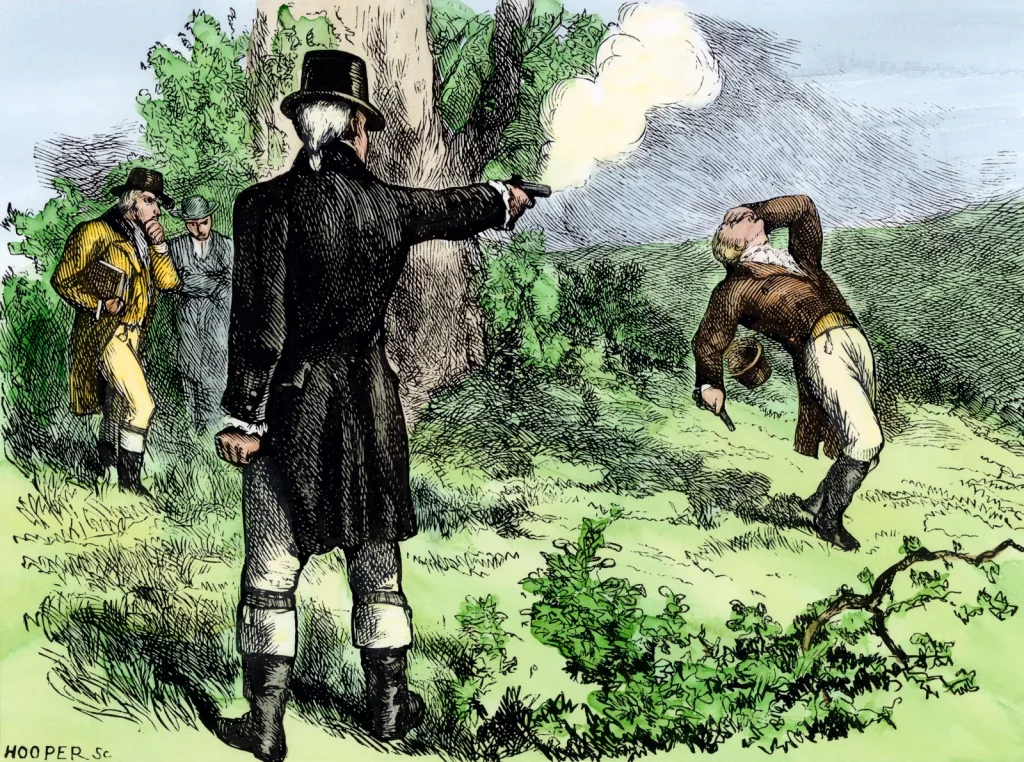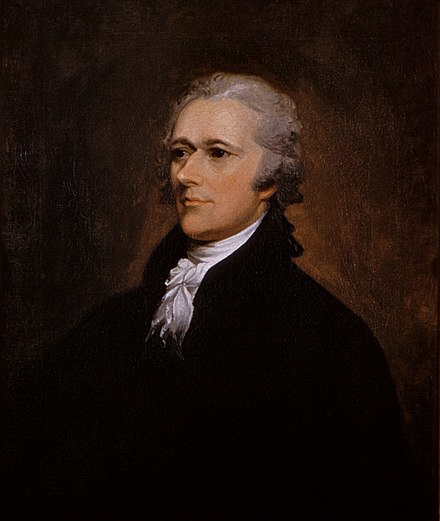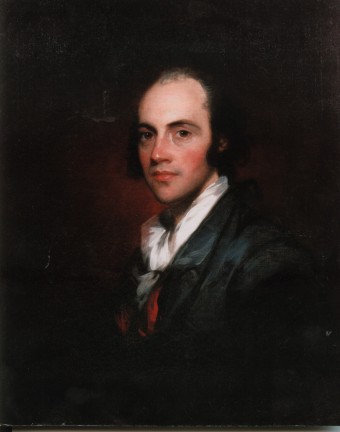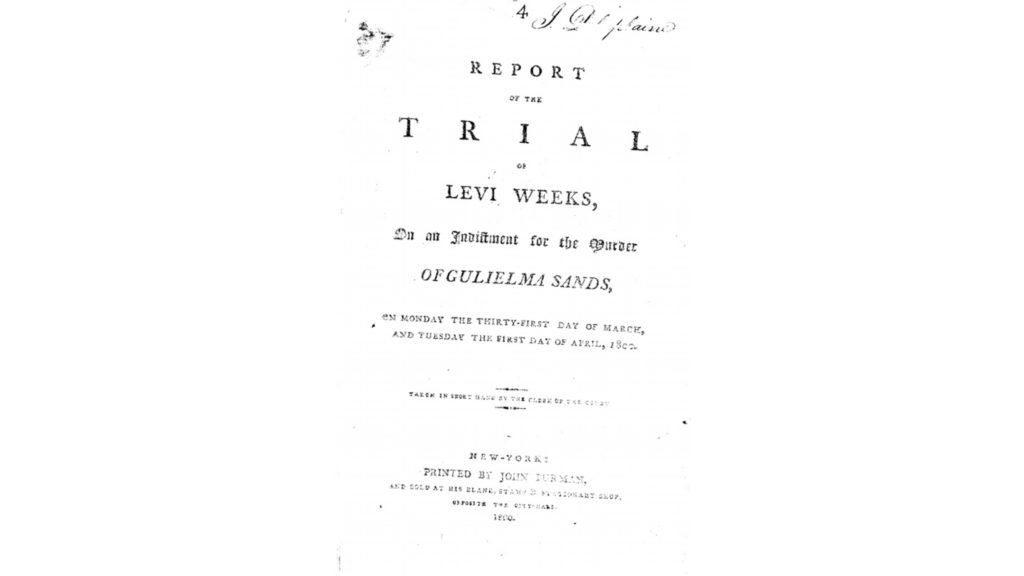Performances in theater and movies often draw from real-life experiences for inspiration. Take Hamilton, a musical by Lin-Manuel Miranda, for example.
It was based on the life of Founding Father Alexander Hamilton and his complicated relationship with Aaron Burr. Alexander Hamilton and Aaron Burr had one of the most complex relationships in American history.
What made their relationship so tumultuous? What caused them to disagree, and what were their professions before they went into politics? Ultimately, how did their relationship end? In this article, we will explore the life and times of these two men and try to answer some of these questions.

The Lives of Alexander Hamilton and Aaron Burr
We must discuss their backgrounds to understand their contentious relationship. Let’s begin with Alexander Hamilton, a leading Federalist and one of the main players in creating the American political economy.
Alexander Hamilton was born on the Caribbean Island of Nevis and came to the American colonies as a poor immigrant. In 1776, he joined the Continental Army during the American Revolution, and George Washington noticed his dedication.
Impressed with his work ethic, Washington took Hamilton on as an aide, and about ten years later, he would serve in the Constitutional Convention.
As one of the convention’s leaders, he openly supported and fought for the ratification of the final document and liked the idea of a stronger centralized government.
In 1789, President Washington appointed Hamilton as the first secretary of the treasury, and during his term, he helped draft financial policies that saved the United States from collapse. Not long after, political parties emerged, making Hamilton the leader of the Federalists.

Now let’s discuss Aaron Burr, Hamilton’s eventual political rival. Burr was born into a distinguished New Jersey family in 1756 and was intellectually gifted, graduating from the College of New Jersey, eventually known as Princeton, at 17.
He distinguished himself during the Patriot assault on Quebec in 1775 when he joined the Continental Army. In addition, he was a brilliant politician who served as a state attorney and was elected to the New York State Assembly in 1784.
He defeated Alexander Hamilton’s father-in-law in a race for the US Senate in 1790. So, it’s no surprise that Hamilton immediately detested Burr and regarded him unfavorably. Yet, their rivalry and animosity toward each other were just beginning.
Different And Yet, So Similar
Despite their different backgrounds, Hamilton and Burr had a lot in common. They were both self-made men who were intelligent, ambitious, and hardworking. They may have lived on separate ends of the social spectrum as children, but their origins were startlingly similar.
For instance, Hamilton’s parents, James and Rachel, never married. James would eventually abandon them, leaving Rachel and Alexander to live in poverty.
Unfortunately, Hamilton’s suffering wouldn’t end there, as his mother died before he reached his teenage years. Now, orphaned and alone, he could only rely on himself and his sharp wit to get him out of his situation.
Luckily, the orphan worked at a local business, and his bosses saw his potential. So, they helped him get an education in the colonies, where he hoped to attend the College of New Jersey but didn’t gain admission. So, Hamilton instead attended Columbia University.
Burr belonged to an influential family. His grandfather was Jonathan Edwards, a famous preacher. His father was also a Calvinist minister who later founded the College of New Jersey in 1746.

It was evident that Burr’s family position had already given him many advantages in life, but tragedy would soon overshadow the Burr household. When Burr was only two years old, his mother and father died. Fortunately, Burr had wealthy relatives who brought him up in the same social circles.
When he was ready, Burr attended the College of New Jersey when he was 13, graduating quickly. When compared to his future rival, Burr had already accomplished a lot by the time he was Burr’s age.
The Rivalry Begins
It’s hard to pinpoint when their rivalry began, but it’s safe to say that their differences slowly came into focus the more interactions they had throughout their lives.
During the Revolutionary War, Hamilton and Burr eagerly joined the colonial army. Burr fought in New York and New Jersey and served until he had to leave due to ill health in 1779. At the start, Hamilton served as George Washington’s aide. After that, Washington rose to prominence on the battlefield at Yorktown, where he distinguished himself as a brilliant military commander.
Both Settle in New York
After the war, Burr and Hamilton settled in New York City, establishing themselves as lawyers and working together on a murder trial. Due to the small circle of the legal world in New York City, Burr and Hamilton often crossed paths and even worked together on a handful of cases.
Neither had much experience with criminal law, but they joined the legal team of Levi Weeks due to their belief he was innocent and possibly due to their own outside personal interests. Levi Weeks was accused o murdering Elma Sands, a young woman he had been courting.
Hamilton owed Levi’s brother, Ezra, a significant debt. Burr was also financially involved, as it was a newly founded bank backed by Burr that financed several of Weeks’ initiatives, including the Manhattan well, where Elma Sands’ body was discovered.

The prosecution’s case rested on circumstantial evidence. Burr and Hamilton argued that the evidence was flimsy at best and that the prosecution had failed to prove their case beyond a reasonable doubt.
The trial was one of the most sensationalized in New York history. Finally, after a trial that tested the stamina of all involved, the Jury acquitted Levi Weeks of all charges.
Political Opposition
Despite their legal successes together, Hamilton and Burr were firmly against each other politically. Burr was a Democratic-Republican, while Hamilton belonged to the Federalist Party. The two ideologies were at odds with each other, which would only mean that Burr and Hamilton were as well.
While he still enjoyed the backing of Washington, Hamilton clashed with both members of his party and Thomas Jefferson’s Democratic-Republican Party. They viewed him as a hazard to the states’ rights-oriented culture they wanted for America.
Meanwhile, Burr was climbing the electorate while being elected to the New York State Assembly and then as attorney general. While Hamilton and Burr had previously disagreed on politics, their hatred was stoked by the 1790 election.
Burr used his power with the legislature to attain an appointment to the United States Senate over Hamilton’s father-in-law. Hamilton was close with his father-in-law, and the family was openly outraged by the election.
Burr ran for president in 1796 and again in 1800 alongside Thomas Jefferson, who thought Burr could deliver New York’s crucial votes. Burr outsmarted Hamilton by assisting the Democratic-Republicans, helping them win the state legislature, and ensuring their electoral support. But there was a problem at hand.
When the national election results were announced, Thomas Jefferson and Burr had tied with John Adams, necessitating that the US House of Representatives chooses a winner. In addition, Hamilton had departed the government and was openly feuding with his fellow Federalists, President John Adams, over a pamphlet that attacked and destroyed Adams’ reelection bid in 1800.
Hamilton regarded Jefferson with dread and suspicion. The two frequently engaged in a verbal sparring match. At the same time, he found Jefferson’s politics repulsive and distrusted Burr even more.
Hamilton considered that Burr would be willing to alter his political convictions to further himself, making him the opposite of the so-called strict Hamilton. Hamilton supported Jefferson instead, breaking the gridlock and making him the next president.
The Final Straw
Burr would take this transgression against him quite personally. Burr’s conduct during the campaign had riled up Thomas Jefferson. Burr was essentially downgraded to vice president and removed from the ticket when Jefferson ran for reelection in 1804.
The final straw for Burr came when Hamilton publicly announced that he found Burr to be a “dangerous man” you couldn’t trust, which Burr saw as character assassination.
The accusation was made ten times worse because Hamilton’s letter to his father-in-law referenced the offensive remarks. Over a few months, the pair exchanged heated letters in which Burr couldn’t abide such disrespectful comments. The relationship between the two men was now beyond repair, and their conflict would have a tragic ending.
Despite Burr’s demands, Hamilton would not recant his comments and stood by this opinion. Like many men of that era, Burr placed a lot of value on personal honor, so it seemed that a duel was the only way to avenge this insult to his character. Burr was accustomed to duels, and Hamilton was not, even if he was familiar with the process. As many already knew, Hamilton was not afraid to attack his opponents with words, and often the disagreements led to duel challenges, which he could avoid.
Unfortunately, this situation didn’t allow Hamilton to escape the challenge; the Federalist leader objected to dueling, especially since his son Philip had died only three years earlier defending his father’s honor. Even then, Hamilton knew he had little choice and could no longer turn down Burr’s challenges.
The Duel that Ended It All
On July 11, 1804, Hamilton and Burr met on the dueling grounds in Weehawken, New Jersey. Burr, an experienced marksman, hit Hamilton in the hip, while his opponent threw away his shot since dueling was illegal in New York and New Jersey. Hamilton spent about 30 hours in excruciating pain before succumbing to his wounds.
Once Burr returned home, he felt relief, believing he had finally silenced his longtime rival and righted the wrongs inflicted upon him. But Burr’s victory was short-lived as the public didn’t see it that way. Reviled as a murderer, Burr knew he wouldn’t be able to wash away the stain on his reputation.
Burr’s political career was over, but not before he realized that Hamilton most likely threw his shot away. The public’s reaction was not what Burr anticipated. Hamilton’s death made him a martyr in the eyes of many, and Burr was now considered a villain. Burr fled to South Carolina and Europe to escape the public’s outrage.
However, his political allies squashed any attempts to convict him of murder, and he was allowed to return to American politics. Yet, even after his ordeal with Hamilton, he never strayed too far from trouble. Eventually, Aaron Burr died in relative obscurity, while Alexander Hamilton’s legacy as one of the United States Founding Fathers lives on.
Were Hamilton and Burr Destined to Duel to The Death?
It’s impossible to know what would have happened if Hamilton and Burr never had their falling out.
Of course, they could have reconciled their differences eventually, but it’s also possible their rivalry would have continued to fester until it boiled over into violence. Some say it was because of their different political ideologies, while others believe it was simply a clash of egos.
These two men were brilliant and ambitious and often competed against each other. They were also some of the most influential figures in early American politics. But did their relationship have to end that way? What if they had learned better lessons from each other?
What if Burr had attempted to pursue his ambition by emulating not just Hamilton’s tenacity but also his commitment to advocating for principles?
What if he discovered a method to be decisive while avoiding being as divisive as Hamilton, combining his natural diplomacy with a higher goal?
What if Hamilton had acquired caution and patience from his opponent enough not to release the sordid facts about his affair and irrevocably damage both marriage and political career?
Burr and Hamilton might have learned from one another if they had observed the benefits in the things that drove them apart and were ready to share political power. However, each of them embraced more self-destructive qualities instead.
One valid point remains: what if Burr and Hamilton had aside their egos for the nation? What could have been accomplished if these two brilliant minds worked together instead of against each other?
Burr and Hamilton’s rivalry continues to be studied today as it provides a cautionary tale about the dangers of ambition and ego. It’s a story about what can happen when two intelligent men allow their differences to get the best of them. But it also shows that despite our differences from our opponents, the world is big enough for rivals to coexist.
It’s possible for people with opposing views to learn from and respect one another. The world is big enough for many viewpoints, and peaceful coexistence is possible. And while both Hamilton and Burr made tragic errors, there was sufficient room in young America for both successes.

